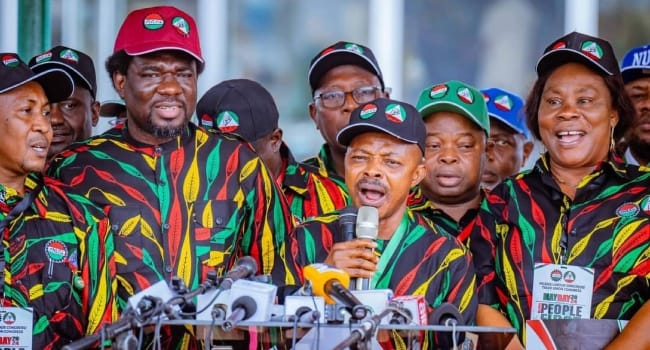The minimum wage negotiation between the government and labour leaders took an interesting turn yesterday, with the federal government reportedly increasing its offer from 60k to 62k, while the labour dropped its demand from 494k to 250k.
Labour leaders made a strategic mistake by agreeing to call off the industrial action after just two days without achieving any tangible results. This decision has weakened their bargaining power and may have inadvertently undermined their credibility.
By calling off the strike without securing significant concessions, labour leaders may have created an opportunity for the government to claim victory. The government’s offer of 62k, an increase of 2k from their initial proposal, technically meets their promise of paying a wage higher than 60k. Should labour reject this and call for another strike, they’ll be met with a lot of skepticism because workers and Nigerians would not take them seriously again.
Besides, despite the harsh economic conditions, the government’s offer represents over 100% increase from the current 30k minimum wage, which is not entirely unfavourable. However, Nigerian workers deserve more, but labour leaders played into the hands of government by signing an agreement that left them in a weak position as such, cannot negotiate for more at this material time.
Similarly , the federal government’s 25-35% salary increment for its workers, in addition to the six months wage award, may have been a strategic move to preempt the minimum wage negotiations. Although not all federal government agencies have implemented the wage award, it is a significant gesture.
Labour leaders must acknowledge that their strategy has been flawed and adjust their approach in future negotiations. Even if the government decides to add anything again it’ll be at their benevolence because as far as that agreement is concerned, the government is on the driving seat and Nigerians may never accept strike again as antidote to this issue. Already, many believe that the strike action has only benefited a few in the labour unions.
However the issue turns out, going forward, instead of labour focusing solely on wage increases, they should advocate for the creation of safety nets or macroeconomic policies that can make disposable incomes livable.
As suggested by a prominent Cross River leader during a private discussion, in a deregulated inflationary regime like ours, wage rate alone cannot accommodate the needs of workers. Labour should now focus on advocating for policies like reduced pump prices, lower electricity tariffs, less taxation, and a secure environment for thriving enterprises.
It’s time for everybody to move on and wait for another negotiation in the next five years, but with better approaches and negotiators.
-Inyali Peter, Ph.D
















